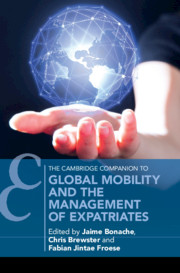Book contents
- Global Mobility and the Management of Expatriates
- Cambridge Companions to Management
- Global Mobility and the Management of Expatriates
- Copyright page
- Contents
- Figures
- Tables
- Contributors
- 1 Global Mobility
- Part I The Expatriation Process of Corporate Expatriates
- 2 The Recruitment, Selection, and Preparation of Expatriates
- 3 Expatriate Adjustment
- 4 Performance Management for Expatriates
- 5 Compensating Global Mobility
- 6 Repatriation and Career Development
- Part II Different Types of Expatriates and Stakeholders
- Index
- References
6 - Repatriation and Career Development
from Part I - The Expatriation Process of Corporate Expatriates
Published online by Cambridge University Press: 12 November 2020
- Global Mobility and the Management of Expatriates
- Cambridge Companions to Management
- Global Mobility and the Management of Expatriates
- Copyright page
- Contents
- Figures
- Tables
- Contributors
- 1 Global Mobility
- Part I The Expatriation Process of Corporate Expatriates
- 2 The Recruitment, Selection, and Preparation of Expatriates
- 3 Expatriate Adjustment
- 4 Performance Management for Expatriates
- 5 Compensating Global Mobility
- 6 Repatriation and Career Development
- Part II Different Types of Expatriates and Stakeholders
- Index
- References
Summary
The chapter discusses the important role that repatriation plays in career development or an international assignee’s personal and professional career outcomes acquired, developed, and accumulated over time. Attention is devoted to understanding how different types of career resources and competencies, categorized as “knowing how”, “knowing whom”, and “knowing why”, are developed as a function of living and working in another country. The chapter continues by drawing on the traditional bounded and emerging proactive career perspectives to help us understand why returning home is often more complex and difficult than perceived. Next, the chapter examines repatriation “success” from both the organizational and the individual repatriate’s points of view, highlighting objective and subjective interpretations of career success. The chapter concludes with a discussion of the challenges facing the repatriation process at the individual-, team-, organizational-, and country-levels and suggests interventions that could be considered in an effort to improve the likelihood of repatriation success. Implications for future research are also discussed.
Keywords
- Type
- Chapter
- Information
- Global Mobility and the Management of Expatriates , pp. 125 - 150Publisher: Cambridge University PressPrint publication year: 2020
References
- 1
- Cited by

